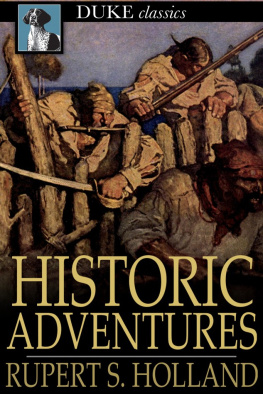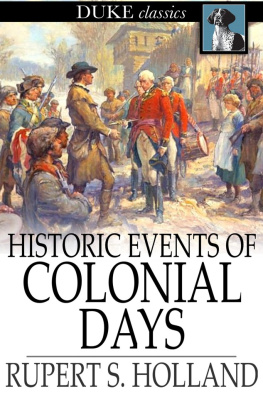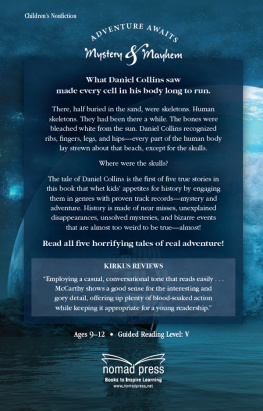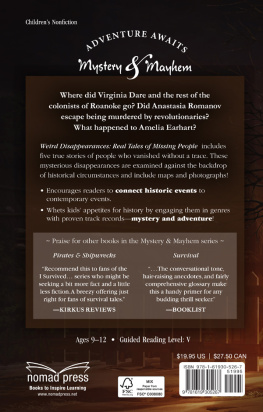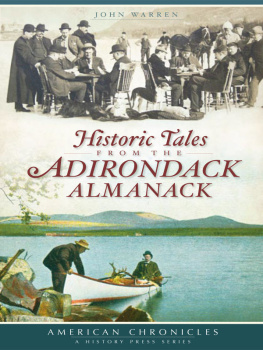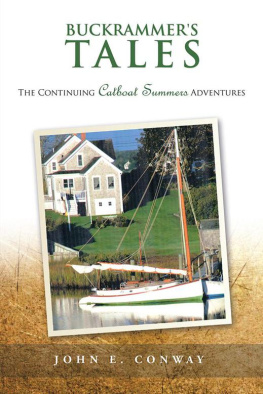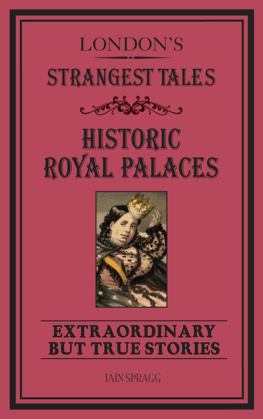HISTORIC ADVENTURES
TALES FROM AMERICAN HISTORY
* * *
RUPERT S. HOLLAND
*
Historic Adventures
Tales From American History
First published in 1913
ISBN 978-1-62013-443-6
Duke Classics
2013 Duke Classics and its licensors. All rights reserved.
While every effort has been used to ensure the accuracy and reliability of the information contained in this edition, Duke Classics does not assume liability or responsibility for any errors or omissions in this book. Duke Classics does not accept responsibility for loss suffered as a result of reliance upon the accuracy or currency of information contained in this book.
Contents
*
I - The Lost Children
*
The valleys of Pennsylvania were dotted with log cabins in the days ofthe French and Indian wars. Sometimes a number of the little housesstood close together for protection, but often they were built farapart. Wherever the pioneer saw good farm land he settled. It was a newsensation for men to be able to go into the country and take whateverland attracted them. Gentle rolling fields, with wide views of distantcountry through the notches of the hills, shining rivers, splendid uncutforests, and rich pasturage were to be found not far from the growingvillage of Philadelphia, and were free to any who wished to take them.Such a land would have been a paradise, but for one shadow that hungover it. In the background always lurked the Indians, who might at anytime, without rhyme or reason, steal down upon the lonely hamlet orcabin, and lay it waste. The pioneer looked across the broad acres ofcentral Pennsylvania and found them beautiful. Only when he had builthis home and planted his fields did he fully realize the constant perilthat lurked in the wooded mountains.
English, French, and Spanish came to the new world, and the Englishproved themselves the best colonists. They settled the central partof the Atlantic Coast, but among them and mixed with them were peopleof other lands. The Dutch took a liking for the Island of Manhattanand the Hudson River, the Swedes for Delaware, and into the colony ofWilliam Penn came pilgrims from what was called the Palatinate, Germans,a strong race drawn partly by desire for religious freedom, partly bythe reports of the great free lands across the ocean. They brought withthem the tongue, the customs, and the names of the German Fatherland,and many a valley of eastern Pennsylvania heard only the German languagespoken.
The Indian tribes known as the Six Nations roamed through the countrywatered by the Susquehanna. They hunted through all the land south ofthe Great Lakes. Sometimes they fought with the Delawares, sometimeswith the Catawbas, and again they would smoke the calumet or pipe ofpeace with their neighbors, and give up the war-path for months at atime. But the settlers could never be sure of their intentions. WilyFrench agents might sow seeds of discord in the Indians' minds, andthen the chiefs who had lately exchanged gifts with the settlers mightsuddenly steal upon some quiet village and leave the place in ruins.This constant peril was the price men had to pay in return for the rightto take whatever land they liked.
In a little valley of eastern Pennsylvania a German settler named JohnHartman had built a cabin in 1754. He had come to this place with hiswife and four children because here he might earn a good living from theland. He was a hard worker, and his farm was prospering. He had horsesand cattle, and his wife spun and wove the clothing for the family. Thefour children, George, Barbara, Regina, and Christian, looked upon thevalley as their home, forgetting the German village over the sea. Notfar away lived neighbors, and sometimes the children went to play withother boys and girls, and sometimes their friends spent a holiday onJohn Hartman's farm.
The family, like all farmers' families, rose early. Before they beganthe day's work the father would read to them from his big Bible, whichhe had brought from his native land as his most valuable possession. Ona bright morning in the autumn of 1754 he gathered his family in theliving-room of his cabin and read them a Bible lesson. The doors andwindows stood open, and the sun flooded the little house, built of roughboards, and scrupulously clean. The farmer's dog, Wasser, lay curledup asleep just outside the front door, and a pair of horses, alreadyharnessed, stood waiting to be driven to the field. Birds singing inthe trees called to the children to hurry out-of-doors. They tried tolisten to their father's voice as he read, and to pay attention. As theyall knelt he prayed for their safety. Then they had breakfast, and thefather and mother made plans for the day. Mrs. Hartman was to take theyounger boy, Christian, to the flour-mill several miles away, and ifthey had time was to call at the cabin of a sick friend. The father andGeorge went to the field to finish their sowing before the autumn rainsshould come, and the two little girls were told to look after the housetill their mother should return. Little Christian sat upon an old horse,held on by his mother, and waved his hand to his father and George as herode by the field on his way to the mill.
The girls, like their mother, were good housekeepers. They set the tablefor dinner, and at noon Barbara blew the big tin horn to call her fatherand brother. As they were eating dinner the dog Wasser came running intothe house growling, and acting as if he were very much frightened. Mr.Hartman spoke to him, and called him to his side. But the dog stood inthe doorway, and then suddenly leaped forward and sprang upon an Indianwho came around the wall.
The peril that lurked in the woods had come. John Hartman jumped to thedoor, but two rifle bullets struck him down. George sprang up, only tofall beside his father. An Indian killed the dog with his tomahawk.Into the peaceful cabin swarmed fifteen yelling savages. Barbara ran upa ladder into the loft, and Regina fell on her knees, murmuring "HerrJesus! Herr Jesus!" The Indians hesitated, then one of them seized her,and made a motion with his knife across her lips to bid her be silent.Another went after Barbara and brought her down from the loft, and thenthe Indians ordered the two girls to put on the table all the food therewas in the cabin.
When the food was gone the savages plundered the house, making bundlesof what they wanted and slinging them over their shoulders. They tookthe two little girls into the field. There another girl stood tied tothe fence. When she saw Barbara and Regina she began to cry, and calledin German for her mother. While the three frightened girls stood closetogether the Indians set fire to the cabin. Very soon the log house thathad cost John Hartman so much labor was burned to the ground. When theirwork of destruction was completed the Indians took the three childreninto the woods.
At sunset Mrs. Hartman returned from the flour-mill with littleChristian riding his horse, but when she came up the road it seemed asif her house had disappeared. Yet the pine trees, the fences, the plowedfields, and the orchard were still there. The little boy cried, "Whereis our house, mother?" and the poor woman could not understand.
The story of what had occurred was only too plain to her a few minuteslater. What had happened to many other pioneers had happened to herfamily. Clutching Christian in her arms she ran to the house of hernearest neighbor. There she heard that the Indians had left the sametrack of blood through other parts of the valley; that farmers hadbeen slain; their crops burned; and their children carried off into thewilderness. The terrified settlers banded together for protection. Forweeks new stories came of the Indians' massacres. If ever there wereheartless savages these were! They did not carry all the children totheir wigwams; some were killed on the way; and among them was littleBarbara Hartman. Word came from time to time of some of the stolenchildren, but there was no word of Regina or Susan Smith, the daughterof the neighboring farmer.

